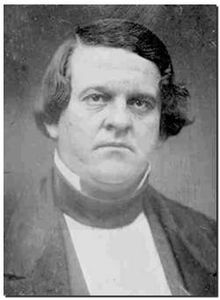Howell Cobb (politician, 1815)
Howell Cobb (born September 7, 1815 in Jefferson County , Georgia , † October 9, 1868 in New York City ) was an American politician . He served in President James Buchanan's cabinet from 1857 to 1860 as Secretary of the Treasury and was Governor of Georgia. He represented this state both in the US House of Representatives and in the Provisional Confederate Congress . He was speaker in both chambers of parliament .
Early years
Howell Cobb was born in Jefferson County, the eldest child of Sarah and John Cobb. His younger brother Thomas Reade Rootes Cobb later became a well-known lawyer and brigadier general in the Army of the Confederacy . Around 1819 the family moved to Athens , where Howell Cobb attended the University of Georgia and graduated in 1834. He was admitted to the bar in 1836, a year after he married his wife, Mary Ann Lamar. This marriage produced twelve children, six of whom died early.
politics
House of Representatives
Although Howell Cobb was a sought-after lawyer, he wanted to be a politician. Like his father, John Cobb, he was a supporter of Andrew Jackson. He trained his rhetorical skills at an early age in debates at the university. In 1837 he was elected to the Georgia State Court, of which he served until 1841. A year later he was put up as a Democratic candidate in the 28th Congress election and was elected to the House of Representatives. His uncle, who also bore the name Howell Cobb , was a member of this from 1807 to 1812.
In his first term he became chairman of the House Committee on Mileage ; he was re-elected three more times. During his time in Congress, he assisted President James K. Polk in the Mexican-American War. He was also an advocate of slavery and has been involved in many discussions about it. With his advocacy for the interests of the South, he angered many members of his own party, who later took revenge on him by blocking his ascending career. In his last term of office he was the Speaker of the House of Representatives from 1849 to 1851 . When the compromise of 1850 was agreed, he was convinced of it and worked together with the two Whigs Alexander H. Stephens and Robert Toombs to make this compromise binding nationwide.
governor
He left Congress in 1851 and was elected governor of Georgia that year. The support of the Democrats and Whigs, both in favor of the 1850 compromise, ensured that the leader of this pro-compromise coalition won the gubernatorial election. But since the adherents of slavery had still not forgiven him for the compromise, his policy was difficult from the start. When Stephens and Toombs also denied him support from the Whigs (he had previously tried to convince them to join the Democrats), he was completely politically isolated. He then resigned from the office of governor and went back to his private life.
return
On March 4, 1855, he was elected to the 34th Congress and took over the post of finance minister in the Buchanan cabinet . He held this position until his resignation in December 1860.
Civil War
After his resignation, he turned the Confederates to and was on February 24, 1861 in Montgomery ( Alabama selected) as President of the Constituent Assembly of the new Federal States. On February 13, 1862, he became Brigadier General and on September 9, 1863, Major General . His brigade played an important role in the battle for Crampton Gap during the Battle of South Mountain on September 14, 1862. On April 20, 1864, he was captured by Union forces at Macon and imprisoned as a prisoner of war. He died four years later in New York and was buried in Athens.
See also
literature
- David J. Eicher: The Civil War in Books. An Analytical Bibliography. University of Illinois, Urbana IL et al. 1997, ISBN 0-252-02273-4 .
- Richard N. Current (Ed.): Encyclopedia of the Confederacy. 4 volumes. Simon & Schuster, New York NY et al. 1993, ISBN 0-13-275991-8 .
- John H. Eicher, David J. Eicher: Civil War High Commands. Stanford University Press, Stanford CA 2001, ISBN 0-8047-3641-3 .
- Ezra J. Warner: Generals in Gray. Lives of the Confederate Commanders. Louisiana State University Press, Baton Rouge LA 1959 (Reprinted ibid. 1992, ISBN 0-8071-0823-5 ).
Web links
- Howell Cobb (politicians, 1815) in the Biographical Directory of the United States Congress (English)
- The New Georgia Encyclopedia (English)
- Howell Cobb at the National Governors Association (English)
- Howell Cobb in the Miller Center of Public Affairs of the University of Virginia (English)
- Howell Cobb in the database of Find a Grave (English)
| personal data | |
|---|---|
| SURNAME | Cobb, Howell |
| BRIEF DESCRIPTION | American politician and Confederate general |
| DATE OF BIRTH | September 7, 1815 |
| PLACE OF BIRTH | Jefferson County , Georgia |
| DATE OF DEATH | October 9, 1868 |
| Place of death | New York City |






